Knowledge Forum “The Role of International Cooperation in Protecting Lives, Livelihoods, and Dignity” With UN Under-Secretary-General Nakamitsu Izumi as a Keynote Speaker
2025.11.13
Eighty years after the end of World War II (WWII) and the founding of the United Nations (UN) to maintain international peace and security, the world continues to grapple with complex challenges—ranging from armed conflicts, climate change and trade tensions. The achievement of the Sustainable Development Goals (SDGs). On Aug. 4, 2025, the JICA Ogata Sadako Research Institute for Peace and Development (JICA Ogata Research Institute) hosted the Knowledge Forum “The Role of International Cooperation in Protecting Lives, Livelihoods, and Dignity
.” The keynote was delivered by Nakamitsu Izumi, UN Under-Secretary-General and High Representative for Disarmament Affairs.
In her keynote speech titled “International Cooperation Toward a World Where People's Lives, Livelihoods, and Dignity Are Protected,” Nakamitsu addressed three interrelated topics: global challenges and the UN’s role, the consequences of militarization, and the strategic direction for future cooperation.
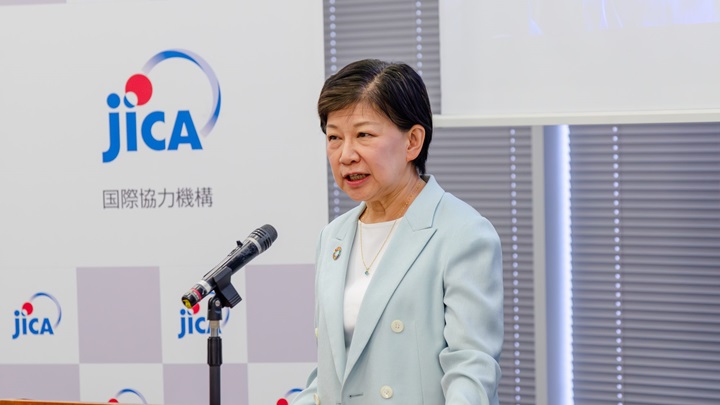
Nakamitsu Izumi, UN Under-Secretary-General and High Representative for Disarmament Affairs, gives a keynote speech.
On the first topic, global challenges and the UN’s role, Nakamitsu highlighted that we are in an era of unprecedented transformation, which is marked by disrupted international order widening systemic inequality and disparities in Japan and around the world. She warned of a downward spiral that pushes the most vulnerable people into further crises. Furthermore, noting the record-high global military spending and economic competition exacerbating global imbalances, she stressed the urgent need for renewed international cooperation. As the world is nevertheless gradually falling into a vicious cycle where short-term national interests are prioritized over international cooperation, Nakamitsu emphasized that a course correction is essential.
On the consequences of militarization, Nakamitsu explained that countries are diverting resources away from investment in humanitarian and welfare sectors to defense budgets. The global trend of responding to threats with military preparedness instead of peaceful diplomacy, negotiation and cooperation is unsustainable. Nakamitsu noted that true security cannot be achieved with weapons and that more resources can be put into development if defense budgets are reduced.
On the strategic direction of future cooperation, Nakamitsu outlined key priorities: reinforcing multilateralism, undertaking a fundamental overhaul of the UN system, strengthening disarmament frameworks to safeguard citizens and global stability, and critically reassessing the concept of security itself. Nakamitsu called for a fundamental shift from a security paradigm rooted in confrontation and arms proliferation to one based on diplomacy, cooperation, and human security. She concluded by underscoring that the decisions made today will shape the global landscape for decades to come.
Following the keynote, a panel discussion featured Nakamitsu and the following: Nagai Yosuke, Executive Director, Accept International ; and Miyazaki Katsura , Executive Senior Vice President, JICA. The moderator was Kamei Haruko, Director General, JICA Ogata Research Institute. The discussion explored youth engagement, citizen participation and Japan’s potential leadership role in advancing international cooperation.
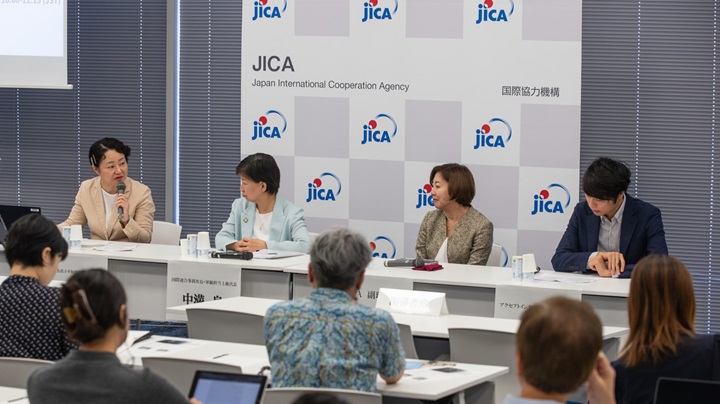
Speakers discuss a broad range of topics, from Japan’s roles to messages for youths.
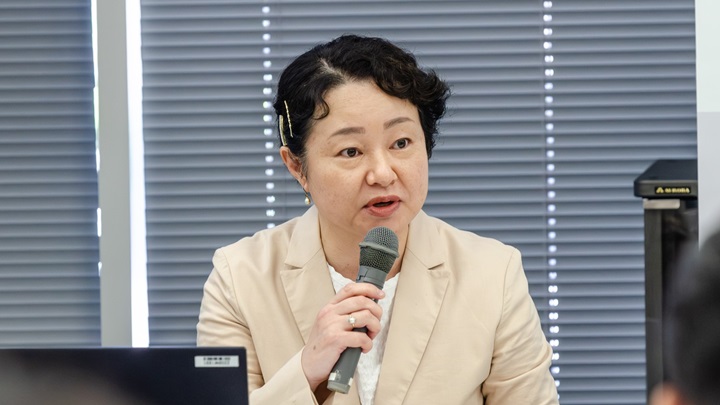
The moderator, Kamei Haruko, Director General, JICA Ogata Research Institute
Nagai shared insight from his work reintegrating former members of armed groups in countries like Somalia. He stressed the importance of aligning Japan’s international cooperation activities with its national interests and communicating the significance of these activities to the people to gain their support. Nagai also mentioned that we should not be overwhelmed by frustration or fear, nor should we focus solely on ourselves or our own countries from a short-term perspective. Instead, we need to maintain a long-term, broad outlook. He added that youth participation is the key and expressed his hopes for new approaches that solve problems by maximizing the roles of youths.
Miyazaki reflected on the 60th anniversary of the Japan Overseas Cooperation Volunteers (JOCVs), noting Japan’s “partner-first” approach and people-centered philosophy. Miyazaki noted that while she thinks that these approaches are fundamentally sound, we should not simply conclude that everything is fine just because they are correct. She emphasized the need to communicate quick, visible outcomes to earn public understanding and support for international cooperation. In addition, she pointed out the importance of helping the Japanese people feel that events happening outside Japan are relevant to them.
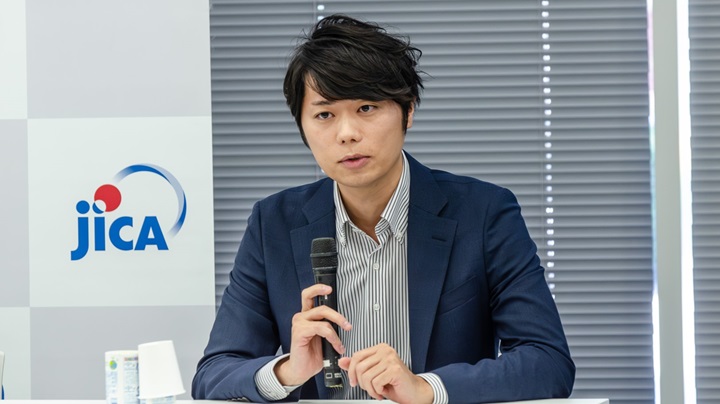
Nagai Yosuke, Executive Director, Accept International
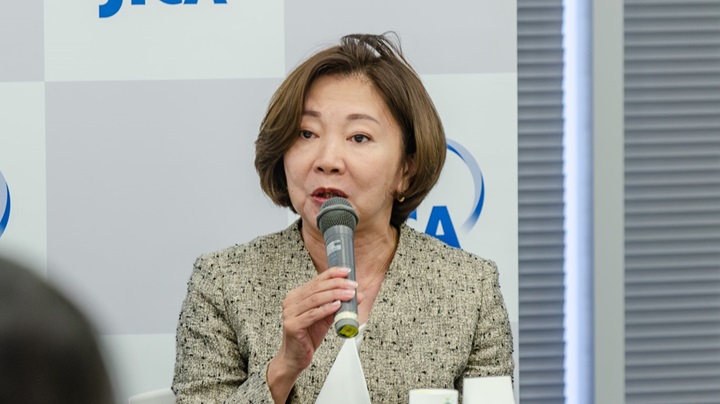
Miyazaki Katsura, Executive Senior Vice President, JICA
Nakamitsu introduced UN training programs aimed at enhancing youth skills and emphasized the need to take multifaceted approaches which combine various efforts as if they are pieces of a puzzle to address global challenges. She then noted that the Japanese should be proud that Japan has been able to maintain peace for 80 years since the end of WWII. She added that in UN settings, Japan is seen as a trustworthy member state. Nakamitsu expressed hopes for Japan to continue playing a leading role in bridging global divisions by promoting the concept of human security, which covers both development and security, while maintaining that trust.
More information about this Knowledge Forum can be found here:
A video recording of this event is available here:
For the JICA Ogata Research Institute’s activities around human security, visit here:

事業事前評価表(地球規模課題対応国際科学技術協力(SATREPS)).国際協力機構 地球環境部 . 防災第一チーム. 1.案件名.国 名: フィリピン共和国.

事業事前評価表(地球規模課題対応国際科学技術協力(SATREPS)).国際協力機構 地球環境部 . 防災第一チーム. 1.案件名.国 名: フィリピン共和国.

事業事前評価表(地球規模課題対応国際科学技術協力(SATREPS)).国際協力機構 地球環境部 . 防災第一チーム. 1.案件名.国 名: フィリピン共和国.

事業事前評価表(地球規模課題対応国際科学技術協力(SATREPS)).国際協力機構 地球環境部 . 防災第一チーム. 1.案件名.国 名: フィリピン共和国.

事業事前評価表(地球規模課題対応国際科学技術協力(SATREPS)).国際協力機構 地球環境部 . 防災第一チーム. 1.案件名.国 名: フィリピン共和国.
scroll